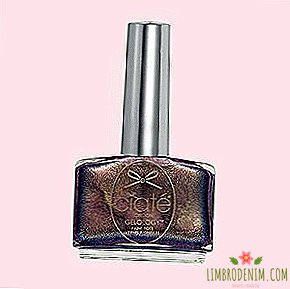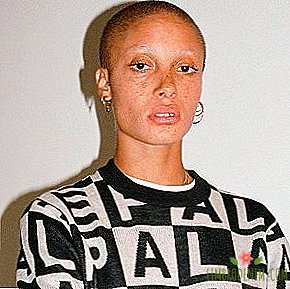Body as evidence: What we know about the FEMEN movement
ACTIVATION OXANA SHACHKO, PRELIMINARY DATA, She committed suicide at the age of thirty-one; this became known the night before. Shachko is called one of the founders of the radical actionist movement FEMEN. Organized ten years ago in Ukraine for “fighting patriarchy in its three manifestations - sexual exploitation of women, dictatorship and religion”, the movement made a name for itself by protest actions, whose participants with bare breasts and slogans written on torso broke through to high-ranking politicians at public events.
The peak of media interest in the activities of the movement was left behind, some of the activists who stood at the origins of the organization (including Shachko) left it because of ideological differences, and the topless protest as a method received an ambiguous assessment from feminist groups. Regarding whether to consider FEMEN as one of them, opinions differ again - at the same time, in the statutes of the organization feminism is registered as one of the main ideological attitudes. As the activist and press agent of the group Inna Shevchenko claimed in 2011, its members "did not want to be ordinary feminists ... Women's organizations and associations in this country only write papers and nothing more. We need activists to undress in the streets with shouts." Be that as it may, FEMEN remains one of the most recognizable movements for women's rights, and its branches today exist in at least a dozen countries around the world.
Ukraine is not a brothel
Although the goals, tactics and composition of FEMEN have changed more than once since their founding, one “target” for movement has remained a priority from the very beginning - the sexual exploitation of women. The first large-scale action organized by the group was called “Ukraine is not a brothel” and set as its goal to destroy the image of Ukraine as a European center for sex tourism. The problem still remains relevant: according to the International HIV / AIDS Alliance, in 2012, up to 1.5% of Ukrainian women were involved in sex work - more than in any other Eastern European country (FEMEN activist Inna Shevchenko voiced even more shocking numbers - sixty percent - but they could not find confirmation). On the eve of the European Football Championship 2012 in Ukraine, they even suggested legalizing sex work. FEMEN responded to this offer with another series of actions.
The anti-clerical protest became another important aspect of FEMEN’s activities, which considered religion a repressive patriarchal tool. The group, which today calls itself atheistic, did not distinguish between different confessions and religious institutions: over the years, FEMEN activists bared themselves before Pope Benedict and Patriarch Cyril, they called the bells of St. Sophia Cathedral in Kiev during the pro-rifer demonstration organized by the Ukrainian Orthodox Church, and protested Islamic regimes, whose laws are based on sharia regulations, at the London Olympics.
FEMEN's political views are not too clear. The ideal enemy and embodiment of the dictatorship for them was Vladimir Putin, whom the activists unanimously called the forerunner of the Apocalypse, but then the not quite consistent jumble begins. So, a year and a half after the protest against Donald Trump under the slogan "grab patriarchy by the balls" (this time FEMEN even had a wax copy of a politician exhibited in Madrid), co-founder of the movement Alexander Shevchenko, on the eve of the recent Helsinki summit, made a strange attempt to negotiate with the Patriarchate and released an appeal to all the same Trump, urging him not to meet with "the most dangerous man on the planet."
Eminence grise
There is still no consensus about who was still at the helm of FEMEN. According to the official legend, the movement was organized by Anna Gutsol, joined by Inna Shevchenko, Oksana Shachko and Alexander Shevchenko. However, according to the film “Ukraine is Not a Brothel” by Australian documentary filmmaker Kitty Green, the first several years of the group’s action were coordinated by a certain Victor Svyatsky. Moreover, in the tape the man claimed that he had completely invented FEMEN. The truth is most likely somewhere in the middle. After the release of the film in 2013, activist Inna Shevchenko gave an interview in which she reluctantly admitted that Svyatsky was indeed a man who at first seriously helped FEMEN. Later, Anna Hutsol confirmed this, although, according to her, the role of Svyatsky was greatly exaggerated: "Victor is our friend ... But to talk about what he came up with FEMEN ... We collectively made decisions, and a lot came to mind in the process of practice. And Victor is for us periodically helped. He is a very good technologist. "
Whether Svyatsky was a gray cardinal of the movement or not, the people who brutally beat him in the summer of 2013 did not specify. The incident happened on the eve of Putin’s visit to Kiev to events dedicated to the 1025th anniversary of the Baptism of Russia. The attack on Svyatskiy FEMEN was unequivocally regarded as an act of intimidation by the special services. “Then on July 27, on the day of the Baptism of Russia, everything was done so that we didn’t carry out the action. In the morning they attacked me at the entrance, stole my dog,” said Anna Gutsol. “Then the girls were abducted near the house together with the press photographer New York Times. In the evening we found them at the police station. They were released only when Patriarch Kirill left. That same evening they attacked me again. We thought it was connected with the arrival of Cyril, because before that there wasn’t: well, two days, fifteen, well, fine ... But this is not over. "
"We understood that something bad was starting to happen. There were working methods that weren't there before." Hutsol is referring to a search in the FEMEN office conducted by the Ukrainian police in late August 2013: “We found a grenade with portraits of Patriarch Kirill and Putin in the sight. Supposedly we prepared an assassination attempt on them. As a result, Sasha Shevchenko and Yan Zhdanov took me to the police. We were ready to sit. But closer to the night we were released and told to come the day after tomorrow for interrogation. " For interrogation, none of the founders of FEMEN did not appear - they flew to France, where they asked for political asylum. Although later FEMEN took part in Euromaidan, and Hutsol (the only one of the four leaders of the movement) returned to Kiev, the events of 2013 became a kind of watershed for the movement. Being extruded from Ukraine, the organization began to develop branches in other countries. This was facilitated by media recognition: in just a couple of years, in 2013-2014, four documentaries were shot about the movement's activities. FEMEN, like almost simultaneously with them Pussy Riot, turned into a brand. And as in the case of Pussy Riot, this led to a split and friction within the movement itself. “We had a conflict in the organization,” explains Yana Zhdanova. “All three of us [Shachko, Zhdanova, Shevchenko], who moved to France, left the organization”.
Chest like a weapon
The topless protest as a brand, a distinctive feature of the shares, didn’t appear right away at FEMEN: it was Shachko who “presented” him, who bared her breasts during Ukraine’s Independence Day in August 2009, before that the activists were limited to frank lingerie and make-up and high heels. The form quickly became popular, although since then it has been repeatedly criticized as an action that more likely condones female objectification rather than serves to regain the right to its body. The topless jihad, organized by FEMEN in protest against Islamic regimes that infringe upon women's rights, also provoked a mixed reaction: commentators noted that activists only complicate the lives of women in the Muslim world, at the same time noting that emancipation in Islamic countries hardly needs patronizing help from side of the West.
FEMEN protest actions were not limited to public exposure only. In 2012, Inna Shevchenko cut down a wooden cross on Independence Square in Kiev, thus expressing support for the convicted members of Pussy Riot. The action caused bewilderment and rejection in the first place among the Pussy Riot themselves. "We are close to the suddenness of manifestation and protest against authoritarianism, but we looked at feminism differently, first of all it concerns the form of performance. We would not undress and stop. Unfortunately, the last action of sawing the cross does not cause a feeling of solidarity" FEMEN Maria Alekhina.
The effectiveness of the actions of the movement argued a lot, asking a rhetorical question: who and what should a bare chest convince? However, if we were to measure them with a reaction, then, with what harshness activists were “screwed” by the police and special services (the members of the movement themselves repeatedly told about the threats of physical violence in their address, and they were not limited to threats only: in Belarus, activists were shaved, beaten and thrown out in the forest), then it can be said that their protest did reach their goal.
As for Shachko, she left the painting after leaving FEMEN. "She wrote anti-religious" icons ", she had exhibitions in Paris and other French cities, in Brussels," Yana Zhdanova said. "Oksana was a very successful young lady, not only as an activist, but also as an artist. She was talented, some of her "Icons" were sold. She quite succeeded as an artist. " Despite this, in the opinion of her acquaintances, she did not find a common language with the French art bohemian: it is believed that her suicide note “You are all fake” is addressed to them. Former activist at least twice tried to commit suicide.
Cover: Femen





